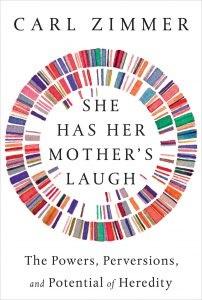
|
|
| photo: Mistina Hanscom | |
What is it about your approach to heredity that necessitated the size and scope of She Has Her Mother's Laugh?
Heredity encompasses a marvelous number of stories, because it has so many meanings for us. Thousands of years before anyone knew about DNA, cultures around the world were developing rules for handing over each generation's wealth to the next. They also developed different explanations for how each generation looked and behaved like the generation before it. Those accounts gave rise in Europe in the 1500s to concepts about race--concepts that conveniently justified persecution and slavery. Many Victorians saw genius and feeble-mindedness as hereditary as well, justifying the status quo.
Heredity became the subject of scientific investigation in the 1800s, in the context of that deep, powerful history. New discoveries about heredity--coming from genetics and other branches of science--have become powerful cultural icons, too. Now, instead of saying we have, for example, "Irish blood," we say we have "Irish DNA"--and read into those words a lot of the cultural traditions that have surrounded heredity for centuries.
To write She Has Her Mother's Laugh, I set out to weave together the cultural history of heredity with its scientific history. And to bring it up to date, I had to add my own experiences, such as investigating my own genome and genealogy--making myself my own heredity guinea pig, in other words.
There are topics, such as climate change or genetically modified organisms, in which the scientific consensus is at odds with significant portions of the American public. In researching and writing this book, did you run into any notable examples of this disconnect?
There are a lot of disconnects when it comes to heredity.
Some have to do with our basic understanding of the underlying science. Statistics can be tricky, for example. If people get a DNA test and learn they have a genetic variant linked to, say, cancer, they may conclude that they are going to die of that cancer. In fact, they may very well have a variant that raises what would otherwise be an incredibly low risk of a rare cancer to an almost incredibly low risk. These misunderstandings may lead people to take drastic action, such as mastectomies to prevent breast cancer, that aren't warranted.
Some of the disconnects have to do with ideology. I've been reporting in recent years on studies on ancient DNA that are changing how we understand human origins. It's clear that our species originated in Africa. Europeans are the descendants of waves of immigrants with different genetic backgrounds who mixed their DNA together in just the past few thousand years. And before a few thousand years ago, Europeans were likely dark-skinned. For reporting these well-supported findings, I've received horrible messages on Twitter, often from people who imply I'm spreading myths as part of a Jewish conspiracy.
Has any of your research affected how you think about having or raising children?
Before I worked on this book, I would worry sometimes that my children had inherited some mysterious gene from me that would ruin their health. It feels like a genetic version of being a hypochondriac. Once I could look at my whole genome, however, I relaxed a lot. I could see that I didn't have extraordinarily dangerous mutations that threatened my own health or that of my children. Like all of us, I do have some variants that raise my risk of some diseases. But I also have some variants that lower my risk. I'm a carrier for a couple serious hereditary conditions, but my wife doesn't carry those same variants, and so our kids didn't get sick.
My older daughter has become curious about her DNA, so we recently got her an Ancestry.com test. She wanted to see what her set of variants meant for her health, so we sat down and plowed through some of the results. I've been helping her understand the complexity of what she's inherited from me and my wife. I think that kind of genetic literacy is going to become more and more important as testing becomes widespread.
 Has your research led you to reconsider any deeply held beliefs about the meaning of personhood?
Has your research led you to reconsider any deeply held beliefs about the meaning of personhood?Heredity is a big part of our identity. We think of ourselves as what the past made us. Yet nature and biotechnology alike can challenge our notions of how heredity defines personhood. In my book, I talk about chimeras--people who have two lines of cells in their bodies. One line might come from a vanished twin. Women can take in fetal cells while they're pregnant, and those genetically distinct cells can develop into new tissues throughout their bodies, including their brains.
New advances in cell biology will allow scientists to push the boundaries of personhood even more--if governments allow them. It will soon be possible to take cheek scrapings from women and transform those cells into eggs. It may be possible to make eggs out of men's skin cells, too. Scientists already know how to fertilize eggs with sperm and grow human embryos in a petri dish. It may be possible to pluck cells from those embryonic clumps and turn them, in turn, into eggs and sperm, and create new human embryos. You could repeat this procedure with cells from four parents or more. And, theoretically, at the end of that procedure, you could end up with an embryo you could implant in a woman and would develop into a child.
23andMe and other companies have made a lot of money through relatively cheap DNA testing. How seriously should people take the analysis they get from these companies?
We don't actually know how much money companies like 23andMe have netted from direct-to-consumer DNA testing, since they're private companies. In fact, it's reasonable to wonder if they're losing money on the service. Sequencing DNA demands sophisticated technology, and interpreting it in a meaningful and responsible way for customers demands a lot of expert, costly talent.
So why is 23andMe attracting investors at a reported valuation of $1.5 billion? It could be that investors are waiting for 23andMe and other companies to strike gold not with consumer reports but with medical breakthroughs.
A lot of customers are consenting to having their DNA studied, and they're also filling out questionnaires about their health. This vast trove of data has led to some important new studies revealing hundreds of genetic links to diseases that we never knew about before. It's possible that this knowledge will point to new ways to treat those diseases.
As for the information that these companies return to their customers, I think we should treat it with educated, curious skepticism. Given that the FDA has approved 23andMe's disease-risk tests, that should inspire confidence in their accuracy. But customers also need to make sure they're not jumping to conclusions. Among its tests, 23andMe can tell you if you have the 4 variant of the APOE gene, which has been linked to Alzheimer's. If you have the variant, that doesn't guarantee you'll get Alzheimer's, and if you don't have it, that doesn't mean you won’t.
Where things get squishier is the ancestry reports that these companies deliver. A number of reporters have tested out different companies and found that they get different percentages of ancestry. That's because each company is building its own method to analyze any given person's DNA. They start by building a database of people from different parts of the world, and then they identify a signature of variants that does a good job of identifying DNA that originated there. If you're from Vanuatu, but the nearest place where your testing company has data from is Taiwan, you're going to get some very fuzzy results.
I spend a lot of time in my book describing how these ancestry tests work, and what their limits are. Some of those limits may be overcome as the databases get bigger. But some of those limits are just fundamental, because our DNA is an imperfect record of our ancestry. --Hank Stephenson, bookseller, Flyleaf Books, Chapel Hill, N.C.

